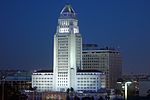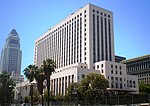Clara Shortridge Foltz Criminal Justice Center
1970s architecture in the United States1972 establishments in CaliforniaBuildings and structures in Downtown Los AngelesCivic Center, Los AngelesCourthouses in California ... and 3 more
Government buildings completed in 1972Government buildings in Los AngelesSkyscraper office buildings in Los Angeles

The Clara Shortridge Foltz Criminal Justice Center (formerly known as the Criminal Courts Building) is the county criminal courthouse in downtown Los Angeles, California, United States. It is located at 210 West Temple Street, between Broadway and Spring Street. Originally known as the Criminal Courts Building, in 2002 it was renamed the Clara Shortridge Foltz Criminal Justice Center, after Clara S. Foltz, the first female lawyer on the west coast of the United States (and also the first person to propose the creation of a public defender's office). The building houses the main offices of the Los Angeles County Public Defender.
Excerpt from the Wikipedia article Clara Shortridge Foltz Criminal Justice Center (License: CC BY-SA 3.0, Authors, Images).Clara Shortridge Foltz Criminal Justice Center
West Temple Street, Los Angeles Downtown
Geographical coordinates (GPS) Address External links Nearby Places Show on map
Geographical coordinates (GPS)
| Latitude | Longitude |
|---|---|
| N 34.054986 ° | E -118.24346 ° |
Address
Clara Shortridge Foltz Criminal Justice Center (Clara Shortridge Foltz Criminal Justice Center)
West Temple Street 210
90012 Los Angeles, Downtown
California, United States
Open on Google Maps








